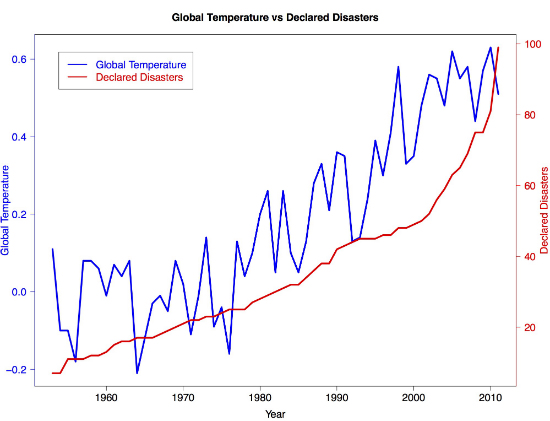
This summer's record low sea ice extent has prompted speculation about how polar bears will be affected. Because polar bears depend on sea ice to catch seals, less sea ice can only be bad for polar bears. But it's not just this year's record low that is cause for concern. Rather, our biggest concern is that the world can only continue to warm if people don't reduce emissions of CO2 and other greenhouse gases (GHGs) -- and a warmer and warmer world will hold progressively less sea ice for polar bears.
The polar bears of western Hudson Bay -- near the southern extreme of the species' range -- are harbingers of things to come for the rest of the world's polar bears unless we address global warming by reducing greenhouse gas emissions.
We know more about Hudson Bay bears than any other population because they are forced ashore for extended periods each summer, making them easier to study than most other polar bear populations. Studies have shown that progressively longer ice-free seasons in the Bay have resulted in thinner bears forced ashore before they can pack on enough fat to assure their welfare through the ice-free season during which they are food deprived. Reduced hunting opportunity seems to be most difficult for mothers trying to raise cubs. In recent years scientists have found fewer yearling bears than normal. Low numbers of yearlings mean more cubs are starving to death before they reach their first birthday.
Although adult bears may eke out an existence for years even with poor sea ice conditions, if the cubs are not surviving, a population ultimately cannot persist. The negative effects we now see in Hudson Bay may not yet be obvious in more northerly parts of the polar bear range, but if we allow GHGs (and hence temperatures) to continually rise, all polar bears ultimately will disappear.
But even if you don't care about this iconic symbol of the Arctic, the signs of trouble we now see in polar bears of Hudson Bay provide a warning to all of us. Climate scientists predict that the frequency and intensity of floods, droughts, heat waves, and monster storms will increase in an ever-warmer world. And as predicted, the frequency of such "natural disasters" has increased in proportion to rising global temperatures.

This graph, created by Amstrup, shows data on disasters from the FEMA website in comparison with the global mean temperature anomaly.
Some have been quick to overlook the pattern and qualify each weather disaster by claiming any one storm or flood cannot be blamed on climate warming. That may be statistically true, but the caveat belies the underlying problem. It also is true that highway fatalities are more frequent at higher speed and the incidence of Type 2 diabetes is higher with elevated obesity. But, you never hear the highway patrol follow their accident report by saying we cannot statistically blame this death on the driver's excessive speed. And you never hear a doctor offering the caveat that this person's diabetes cannot be blamed on his obesity. Other factors can always influence any one situation, but the overriding causative pattern is clear.
The fact is, planetary physics and mountains of data verify the world is warming in response to elevated atmospheric GHGs. And, problems caused by a continually warming planet are not restricted to polar bears. The good news is that this is a human-caused problem and humans can solve it. Our research has shown that if we act now, we can save polar bears from extinction. In doing so, we will benefit the rest of life on earth -- including humans.
Photos by explore.org

